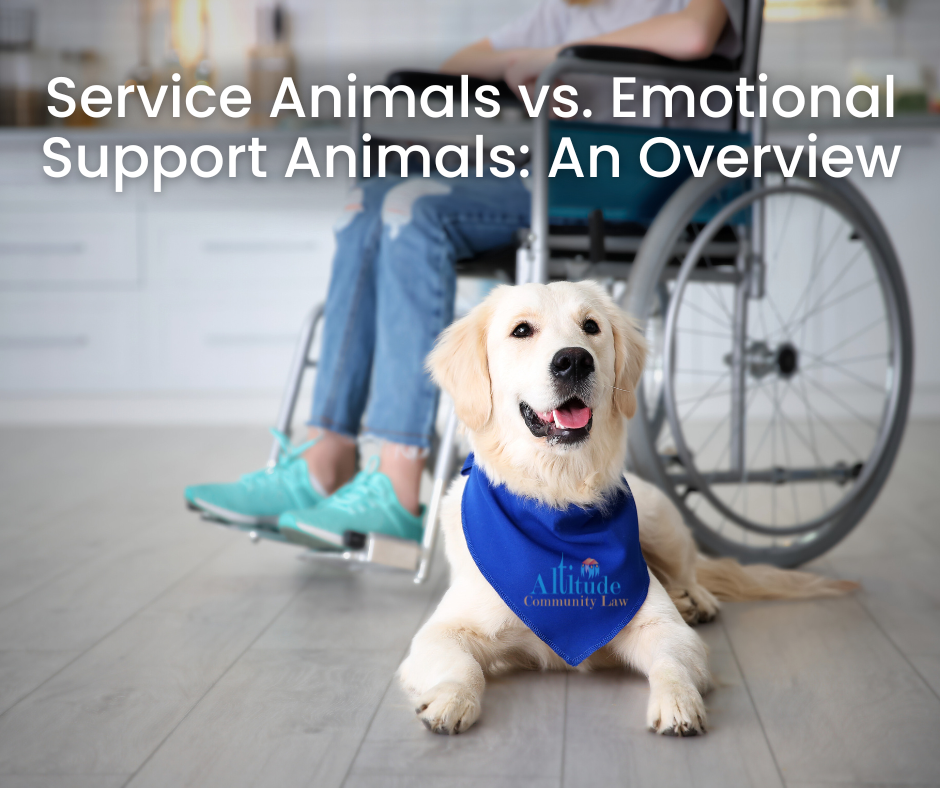
Community associations have been scratching their heads as to the difference between service animals and emotional support animals. Federal law provides for the definition of service animals, but there is very little guidance when it comes to emotional support animals. This can be problematic for associations who may unknowingly be implementing discriminatory practices.
Definition Comparison
A service animal is defined by the Americans with Disability Act (ADA) as a dog or a miniature horse that is individually trained to perform work or certain tasks for the benefit of a person with a disability. Because service animals are often well-trained, most associations do not face issues with service animals.
Emotional Support Animals (or “ESA”), on the other hand, are animals who provide comfort and companionship to an individual. These animals are not trained, and assists an owner with a disability. The term ESA is not clearly defined by the Fair Housing Act (FHA), and can encompass any type of animal (within reason).
These animals are not considered “pets” under federal law. It is important to note that the FHA, and not the ADA, applies to homes. The ADA applies only to public spaces. For more information on the FHA, please see our article.
The Process
A request for an assistance animal is actually a request for a Reasonable Accommodation under the FHA. A Reasonable Accommodation is a modification or adjustment to allow a disabled individual full use and enjoyment of their home.
Depending on the nature of the disability, the association is permitted to request additional information.
Step One: Is There a Disability? A disability is a permanent physical or mental impairment that substantially limits one or more major life activities. A disability may be apparent and obvious, and some disabilities are nonapparent.
Step Two: Request Additional Information. In the event that the disability is not apparent and not obvious, an association may request sufficient and reliable information which will allow the association to verify that the individual meets the FHA definition of “disability.” The information must include a description of the requested accommodation and an explanation of the relationship between the disability and the need for the requested accommodation.
Reliable information can be a determination from a governmental agency, documented receipt of disability benefits, or a note from a healthcare professional. Please note that any online certificates or registrations are not considered reliable.
Restrictions on Assistance Animals
Associations cannot:
- Place limitations on the animal’s breed or size;
- Charge a fee, license or deposit for the animal;
- Charge a registration fee for the animal (although registration itself is allowed);
- Charge the owner for an animal “DNA” test;
- Charge back the cost of attorney fees and advice
- Require the animal be with the owner at all times
However, in the event an assistance animal causes any damage to the property, the association may retroactively charge the owner for those costs.
Existing Rules/Covenants
Some communities have specific pet restrictions in place, such as the number, type, breed, and size of the animals permitted in the community. Some communities have a “no pet policy” and does not allow any animals to be kept as pets.
However, because assistance animals are not “pets,” these covenants cannot be applied to assistance animals. For example, if your community has a strict policy prohibiting pit-type dog breeds, the association cannot enforce this policy against an owner who utilizes a pit-breed as an assistance animal.
That being said, assistance animals do not get a “free pass” to avoid the rules and regulations set forth in the community regarding pets. Repeated violations and/or property damage may warrant the removal of the animal.
Special Circumstances
Under specific circumstances, the association is authorized to demand the removal of the animal. However, most of the time, the association must have evidence of numerous repeated violations sent to the owner that the owner has either ignored or failed to correct.
Dangerous Animals. In the event that an assistance animal bites another person, the association may immediately demand that the animal be removed. However, danger cannot be presumed. The dog must have acted aggressively in some manner and poses a direct threat to the safety of others. Examples can include attempted bites, lunging, growling, or other aggressive behaviors.
Damaging Property. If an assistance animal causes substantial physical damage to the property of others, the association can demand the animal be removed.
Barking/Howling. Barking, howling and other noise-related issues can be grounds for removal if there have been several notices and demands to cure the problem.
Off-Leash Animals. An owner that does not keep the animal on a leash is subject to a fine, as long as the individual’s impairment does not prevent the carrying of a leash.
Waste Removal. If an owner’s impairment renders them unable to dispose of the animal’s waste, they must hire a third-party to safety remove of the waste. If an owner fails to properly dispose of their animal’s waste, an association should first send a demand letter, and, if the violation is not cured, impose a fine.
If you have any questions about service or emotional support animals, please contact one of our Altitude attorneys at 303-432-9999 or email us at [email protected].